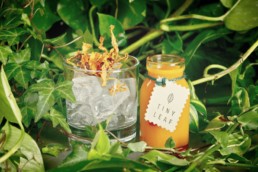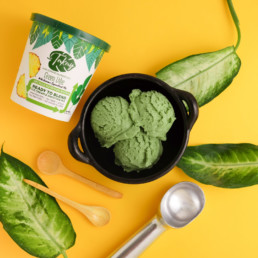February 1, 2018
Food for Action: Zero Waste Restaurants in London and NYC
one-third of global food production, approximately 1.3 billion tons is wasted every year, with an estimated 571,000 tons annually by u.s. restaurants alone! here are a list of restaurants that are doing their part in eliminating food waste.
TINY LEAF – LONDON UK
Tiny Leaf is London’s first organic, vegetarian, zero waste pop up restaurant, events, and catering company. With a focus on food that is created from produce that is given by their trusted suppliers; this is food that would ordinarily be destined for landfill. The restaurant also uses organic purchased produce from guaranteed organic, local wholesalers.
Their focus is currently on festivals, bespoke events and exhibition dinners. Check out their Facebook Page for regular updates.
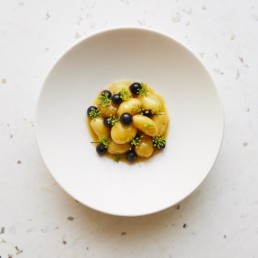
You come for the no-choice menu: small, inventive plates, teamed with equally creative cocktails, all of which are included in the £45 per person price. (There is, apparently, a à la carte option too.) ingredients are sustainable, and many are would-be waste items. That means, while it’s not technically a vegetarian restaurant, the food is light and plant-heavy, with animal products only making fleeting guest appearances.
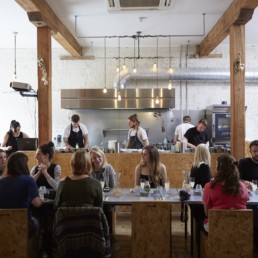
SILO – BRIGHTON UK
SILO IS DESIGNED FROM BACK TO FRONT, ALWAYS WITH THE BIN IN MIND.
The production of waste has been eliminated by merely choosing to trade directly with farmers, using re-usable delivery vessels and choosing local ingredients that themselves generated no waste. Their compost machine set inside Silo turns any scraps and trimmings instantly into a compost used to produce more food, therefore, Closing the loop.
PURE FOODS BORN FROM CLEAN FARMING.
Silo provides quality through purity, adopting a more primitive diet with techniques both modern and ancient. The food they choose respect the natural order, allowing ingredients to be themselves without unnecessary processing. By creating everything on site from its whole form we can capture real food, and real food tastes better.
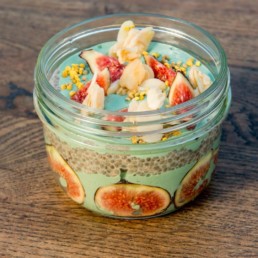
Two things feed into the ethos of this veggie restaurant: your health, and the health of the planet – and it manages to do a stellar job for both with delicious dishes of organic vegetarian food that both cleanse the body and respect the natural provenance of great produce. By using the whole plant from root to fruit, and all food scraps are compost leaving no food waste.
They offer an array of delicious plant-based dishes inspired from around the globe, Farmacy supports both a vegan and vegetarian diet, free from dairy, refined sugars, additives, and chemicals.
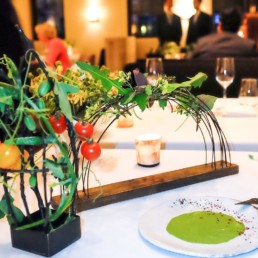
For three weeks in March of 2015, Blue Hill restaurant in Greenwich Village temporarily reinvented itself as wastED, a pop-up devoted to the theme of food waste and re-use.
wastED’s menu took root in the overlooked byproducts of our food system, drawing ingredients from farmers, fishermen, distributors, processors, plant breeders, producers, restaurants, and retailers. The team worked with more than twenty guest chefs to curate daily specials.
Check out Blue Hill Farm and Market
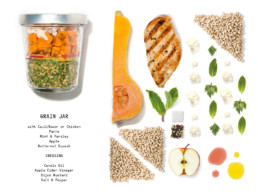
ANCOLIE: THE EPICUREAN CANTINE – NYC
Ancolie offers fresh, delicious breakfast, lunch and snack options with sustainable, well-sourced ingredients packaged in reusable glass jars. Their recipes are prepared in our kitchen daily, inspired by traditional French home cooking and international flavors.
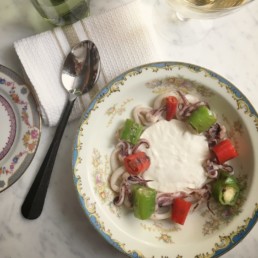
GRAFFITI EARCH COMBINES SUSTAINABILITY AND DELICIOUSNESS – NYC
Located in Tribeca, with an intimate space seating 20, Graffiti Earth features Chef Jehangir Mehta’s signature eclectic style of dishes with a strong emphasis on sustainability in a more elegant downtown vibe.
Even outside the kitchen, Graffiti Earth is focused on sustainability from furniture, made from renewable materials, down to the napkins. The dining room of Graffiti Earth has the same intimate feeling as the original with a bit more elegance. A significant feature wall displays dishes as a nod to the restaurant’s rural, farmhouse kitchen atmosphere, while warm metals and weathered woods complemented with soft metallic elements for an urban space befitting the restaurant’s Tribeca location.
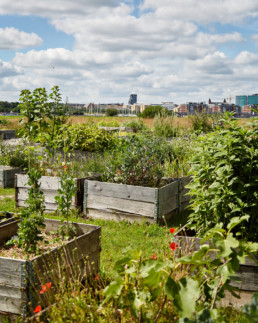
Amass believes in a holistic approach to food that prioritizes not only their guests and gastronomy but also the environment and future as an industry. Their gold organic certification, which ensures that 90% to 100% of our food and beverages are organic and free of pesticides, is only one of the many initiatives they have taken to reduce carbon footprint. By sourcing nearly 95% of their products locally, minimizing ingredient waste and saving water, they want to go beyond labels and give as much care to how they operate as a restaurant as their farmers and purveyors do with the soil and sea.
Furthermore, they want to prove that both environmental and financial sustainability, as well as deliciousness, are mutually reinforcing, not mutually exclusive. Food trim and brown cardboard provide compost for our on-site garden. In the kitchen, Amass continually thinking of how to extract the most out of the ingredients without resorting to the waste bin. They use coffee grounds for flatbreads, dehydrate herb stems for seasonings and fry fish bones as snacks.
Everyone, from restaurants to home cooks, can make a difference, but it first requires a will to do so. Many of their ideas are not the most technically advanced, but they do need effort.
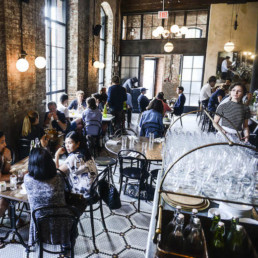
REYNARDS @ WHYTHE HOTEL – BROOKLYN USA
While not completely a zero-waste restaurant. Chef Christina Lecki joined Reynard as executive chef in July 2017, with an ambitious goal: reduce the kitchen’s waste to zero. Cooks there work hard saving as much by-product and scraps as possible to be fermented, dried and used in other dishes.
“Working in restaurants has specifically made me so aware of how much food and trash gets wasted or accumulated in one day,” executive chef Christina Lecki said. “I very much believe it has to be the future of our industry to be more conscious of how we receive products and how much food we waste.”
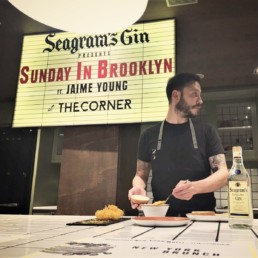
At Sunday in Brooklyn, even the humblest scrap can have a new life as part of the innovative menu by chef Jaime Young, or on the forward-thinking cocktail list developed by award-winning mixologist Claire Sprouse. Take the humble corncob, for instance: After Young uses the corn in a dish, Sprouse will take any unused kernels to make the cream that brings rich texture to cocktails like the corn-infused rum. They turn the remaining cob (and even the corn silk) into stock and teas that enhance various dishes.
This exceptionally creative approach to recycling isn’t just happening just in the culinary realm; it’s part of a bigger trend that’s revolutionizing business — even the auto industry. BMW is leading the trend with the new i3, which features breakthrough details such as surprisingly luxurious interior fabrics made from recycled plastics. Like Sunday in Brooklyn, the BMW i3 proves that innovation can be stylish, too. Watch the video above to take a closer look with photographer Charissa Fay at both of these industry leaders. (source)

